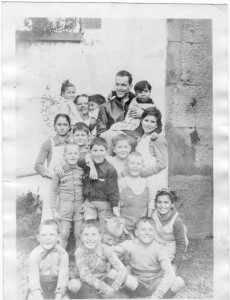Letter: Nick Carter’s death was not in vain

Carter with Esme, taking care of Spanish children at Puigcerdà, fall 1937. Photo courtesy of Nancy Carter Clough.
Dear Editors,
In the December issue, in an article on “Nick” Carter, the writer makes what seems to me some shameful and unwarranted remarks. He says Carter’s death fighting in the British International Brigade was “especially tragic because of what he might have become.” He then says Carter’s decision to enlist in the brigade was “clearly the worst decision of his young life.”
The deaths of all those who joined the Internationals to fight fascism were equally heroic. No exceptions! All, not some, were “might have becomes.” Carter was no special case….
Nick Carter’s motives behind his decision to risk his life fighting fascism …cannot be attributed to a case of “bad judgment,” and that at a distance of 70 years! In that light the motives of all those who died might be questioned.
And equally reprehensible is a kind of creeping anti-communism in remarks such as, “his [Carter’s] understanding grew without any evidence of Communist Party dogma.” Communists in all the International Brigades were the backbone of their commitment to fight, and if necessary, to die fighting fascism. Nick’s life was ennobled by his decision to join with thousands of others in that great struggle.
Perhaps I should correct the manner in which I phrased it above: No one who died for the Republic in Spain was a “might have become.” All were as great in their deaths there as they could have become later if they had survived. That is their triumph!
Pete Gourfain
Brooklyn, NY












